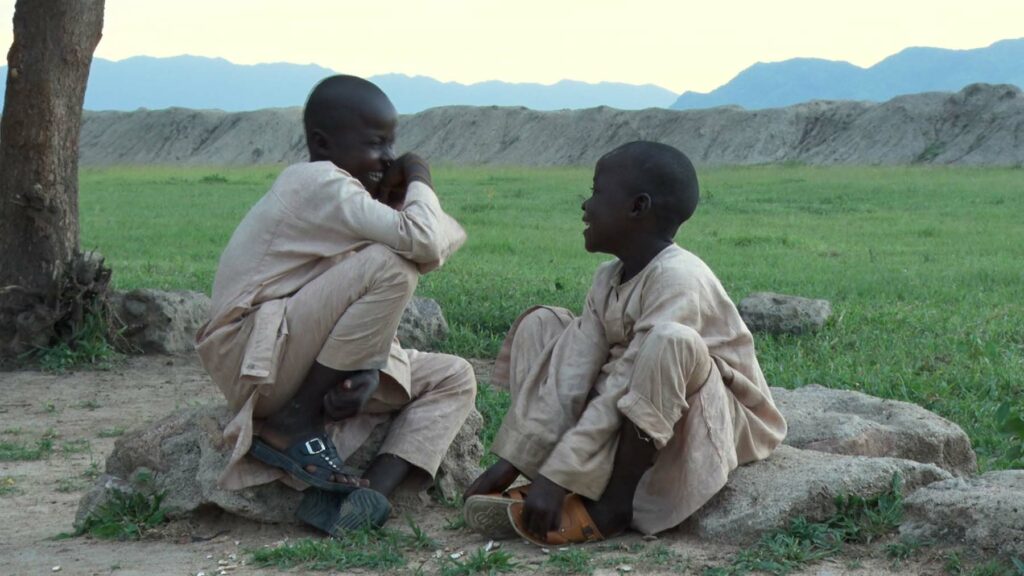
A Dance with the Devil
It’s night, and in the distance, a dog’s barking sounds like an alarm. Then, the noise gives way to the crackling of a blazing fire that accompanies a child’s narration. This is neither a fantastic tale nor a fairy tale. It tells the circumstances of his father’s death—a suicide bomber posing as a chicken seller. “The Specter of Boko Haram,” a 75-minute documentary film written and directed by Cyrielle Raingou, addresses the issue of terrorism in Africa. Boko Haram, a Salafist and jihadist group, has been operating in Cameroon since 2013, with its origin and epicenter in the northeastern region of Nigeria, the State of Borno. The film tells the story, from the perspective of children, of life in a region threatened by this scourge.
The film takes place in the municipality of Kolofata, an extreme northern region located on the border between Cameroon and Nigeria. It offers picturesque and lyrical landscapes with a chain of dormant mountains, almost mysterious. At dawn, while the sun still sleeps, Cyrielle Raingou sets the stage for her film and provides context as an opening.
The muezzin’s call to prayer rings out, revealing the happiness of this beautiful landscape before being interrupted by the distant crackling of firearms, observed with almost indifferent frozen looks by Mohamed and his little brother, Ibrahim. Is this their daily reality? While wondering where the sounds come from, a traditional guitar-playing griot sings a song imploring God to protect Kolofata from Boko Haram.
Although divine protection may not be palpable, the omnipresence of the multinational military force (B.I.R) that pushes the jihadists back into the mountains is noticeable. The village lives under military protection. Amidst this conflict zone, the children (Mohamed, Ibrahim, Falta, Ladki, Isamela, Maloum), in their innocence, sow life amidst the wreckage of burned cars, lush vegetation, livestock, pottery, songs, and armed soldiers around the school. It resembles the fertile soil of these places that give life to a bountiful onion harvest.
Yet, refugees Mohamed and his brother never forget their abduction in Mitchika by the terrorists while they were heading to the Quranic school, the loss of their parents, the 60 lashes, and the horrors they witnessed due to Boko Haram. Could it be the reason why one dreams of the biggest animal in the bush at night, while the other doesn’t dream at all? Undoubtedly, it’s the fear of the specter of Boko Haram and the quest for a peaceful day that leads them to run away from the village with Bello.
Since its release in 2023, the film stands out first for the director’s risk-taking and the political stakes surrounding the issue of terrorism. Technically, it impresses with its script, location scouting, and the editing by Christine Bouteiller, as well as the beautiful images by Cyrielle Raingou and Bertin Fotso. The sound quality by Hervé Guemete, Hubert Domkam, and Florence Hermette (sound design) also contributes to the film’s observational strength. This justifies its selection in several festivals, such as St. Louis’s Docs in the International Competition (Senegal, 2023) and the Durban International Film Festival (South Africa, 2023). Furthermore, the production company Label Vidéo can be proud of the young journey of its creation, which has been awarded the Etnomatograf, Perspectives Paul Robeson, and Golden Tiger prizes.
In summary, “The Specter of Boko Haram” serves as a means of awareness as it aligns with the current security challenges that many African states must face, as terrorism has become a concern for all.
Durban International Film Festival
Catch the 44th edition of the Durban International Film Festival (DIFF), presented by the Centre for Creative Arts at the University of Kwazulu-Natal between 20 Jul 2023 – Sun, 30 Jul 2023
For more information visit: https://ccadiff.ukzn.ac.za
Author
This story emanates from the Talent Press, an initiative of Talents Durban in collaboration with the Durban FilmMart. The views of this article reflect the opinions of the film critic Gaël Hounkpatin.

